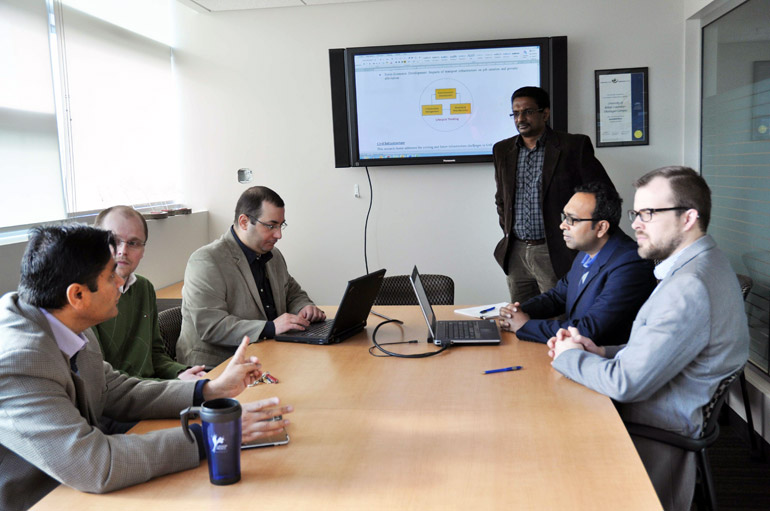
Rehan Sadiq, left, meets with fellow School of Engineering professors, Lukas Bichler, Ahmad Rteil, Kasun Hewage, (standing), Shahria Alam, and Joshua Brinkerhoff to discuss the four-year plan for their research project.
Four-year UBC project involves four countries, exchange opportunities for students
UBC Okanagan’s School of Engineering is leading a four-year interdisciplinary project that could change the way transport infrastructure is managed around the world.
Funded by the Canadian Queen Elizabeth II Diamond Jubilee Scholarship program, the School of Engineering is leading a $1.13-million research project called “Innovative Solutions for Developing and Managing Climate Resilient Transport Infrastructure in South Asia Region: A Lifecycle Thinking Approach.”
The project involves university students from the Commonwealth South Asian countries of Bangladesh, India, Pakistan, and Sri Lanka. Students will work with UBC Okanagan researchers on sustainable transportation infrastructure in Canada and the South Asia Region (SAR).
Prof. Rehan Sadiq, acting director of the School of Engineering, is the principal investigator. Over the next four years, the project will enable 24 graduate students, 16 undergraduate interns, and 20 international graduate students to jointly work on research projects related to efficient and well-developed transport infrastructure.
“Transport infrastructure is the backbone of economic productivity and social well-being in any country, and it must enable the delivery of goods to markets, as well as labour and leisure mobility, without undesirable economic or environmental impact,” says Sadiq.
Due to material erosion accelerated by climate change, Canada and SAR countries face similar challenges with transport infrastructure. In the next decade, however, Canada is expected to invest about $70 billion in public infrastructure projects. In the South Asia Region, an infrastructure gap of more than $2.5 trillion needs to be addressed by 2020, which becomes more daunting as the SAR is one of the most vulnerable regions facing severe and continuous climate change impacts, says Sadiq.
“This program will bring unique opportunities to educate and train young Canadian and Commonwealth students through learning partnerships across the countries that are facing these challenges,” says Sadiq. “The students will gain great awareness about our global community.”
This interdisciplinary project involves UBC Okanagan researchers from the School of Engineering, Faculty of Management, and the Irving K. Barber School of Arts and Sciences. Engineering’s research team includes faculty members and civil engineers Kasun Hewage, Ahmad Rteil, Shahria Alam, mechanical engineers Lukas Bichler, Joshua Brinkerhoff and Spiro Yannacopoulos, Associate Dean of Applied Science. The research team also includes Dean Roger Sugden and faculty member Eric Li of the Faculty of Management, Keith Culver, director of the Okanagan Sustainability Institute and economist Ross Hickey.
“The diversity of perspectives and challenges facing Canadian and SAR partners offers an unprecedented opportunity to engage students from developed and emerging economies in a mutually advantageous research program,” says Sadiq.
The team has already been involved in fundamental and applied-research projects related to infrastructure management, innovative materials development, socio-economic studies, and life-cycle thinking. The new projects will look at possible ways to improve, support, and protect the transport infrastructure and systems with consideration to climate change.
“The exchange of students will promote international collaboration and the development of long-term research projects, which will benefit Canadian and SAR researchers and their partners,” says Sadiq. “We will be sharing our knowledge and experience from Canada, as well as learning from their unique experiences. This is a two-way relationship with great learning and research opportunities for all involved.”
————————————
Background
Launched in June 2014, The Queen Elizabeth II Diamond Jubilee Scholarship aims to cultivate university students to become innovative, global leaders. Queen Elizabeth scholars will be able to work with university researchers in commonwealth countries during academic studies or internships that are between three and 12 months long.
—30—